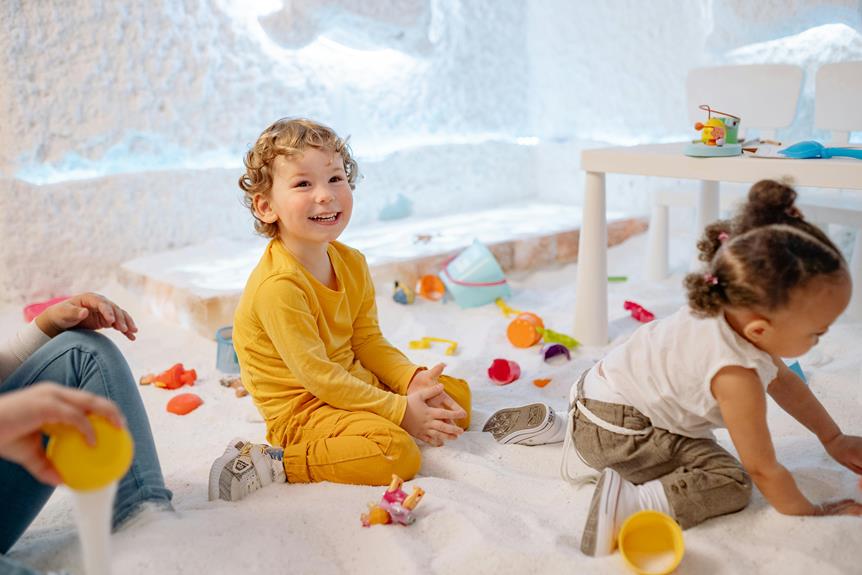
When it comes to selecting educational toys for babies under 12 months, you want to consider items that engage their senses, encourage learning, and aid in motor skills development. From sensory toys that enhance touch to interactive toys that spark curiosity, the options can seem endless. But how do you know which toys are truly the best for your little one's early development? Let's explore the key features that make certain toys stand out in promoting essential skills for babies in their first year of life.
Benefits of Educational Toys
When selecting educational toys for your baby under 12 months, consider the numerous cognitive and developmental benefits they can provide. These toys are designed to stimulate your baby's senses, encourage curiosity, and promote early learning. By engaging with educational toys, your little one can enhance their hand-eye coordination, fine motor skills, and problem-solving abilities. The interactive nature of these toys also helps in developing your baby's social skills as they learn to communicate and interact with others.
Furthermore, educational toys can aid in sensory development by offering various textures, sounds, and colors for your baby to explore. These sensory experiences play a crucial role in your baby's brain development and can help strengthen neural connections. As your baby interacts with different educational toys, they aren't only having fun but also laying the foundation for future cognitive growth. By providing age-appropriate educational toys, you're giving your baby the opportunity to learn and grow in a playful and engaging manner.
Types of Sensory Toys
Consider exploring a variety of sensory toys that cater to your baby's tactile, auditory, and visual stimulation needs. These toys are designed to engage your little one's senses and promote cognitive development. Tactile sensory toys, such as textured balls or soft fabric books, can help enhance your baby's sense of touch and encourage exploration through different textures.
Auditory sensory toys like rattles, musical mobiles, or toys that make crinkling sounds can stimulate your baby's hearing and auditory senses, promoting sound recognition and auditory processing skills.
Visual sensory toys play a crucial role in developing your baby's visual perception and tracking abilities. Items like high-contrast black and white cards, colorful mobiles, or toys with bright contrasting colors can capture your baby's attention and support visual development.
Sensory toys that incorporate multiple sensory elements, such as toys with different textures, sounds, and visual features, can provide a holistic sensory experience for your little one, aiding in overall sensory development.
Developmental Toys for Motor Skills
To enhance your baby's motor skills, introduce toys that encourage reaching, grasping, and hand-eye coordination. Toys such as soft blocks or textured balls are great for promoting reaching and grasping as your baby learns to hold and manipulate objects.
Activity gyms with dangling toys or mobiles can encourage reaching and hand-eye coordination as your little one tries to touch or grab the hanging items. Rattles and shakers are excellent for engaging your baby's senses while also helping them practice grasping and shaking motions.
Another fantastic toy for developing motor skills is a play mat with interactive elements like crinkly textures, mirrors, or attached toys. These encourage your baby to reach, kick, and explore their surroundings, aiding in the development of their gross motor skills.
Simple toys like stacking cups or rings can also help enhance hand-eye coordination and fine motor skills as your baby learns to stack or fit objects together.
Interactive Toys for Cognitive Growth
For enhancing your baby's cognitive growth, interactive toys play a crucial role in stimulating their developing mind and fostering curiosity and problem-solving skills. Interactive toys engage your baby's senses, encouraging exploration and discovery. Toys that make sounds when buttons are pushed or lights up in response to actions help your baby understand cause and effect relationships.
Shape sorters and stacking toys promote cognitive development by encouraging problem-solving and hand-eye coordination. Interactive books with textures, flaps, and sounds can enhance language development and sensory skills. Peek-a-boo toys and nesting cups can help develop object permanence and spatial awareness.
Simple puzzles with large, easy-to-grasp pieces can boost cognitive skills while providing a sense of accomplishment when solved. As your baby interacts with these toys, their brain forms new connections and pathways, laying the foundation for future learning and cognitive abilities. Encouraging play with interactive toys from an early age can support your baby's cognitive development in a fun and engaging way.




